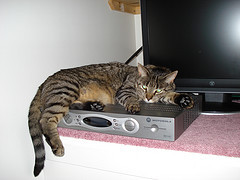Cable Industry Claims Next Generation Of Set-Top Boxes Won’t Use More Electricity Than Refrigerators
According to the Consumer Electronics Association and the National Cable & Telecommunications Association,
the companies involved in the agreement, including Comcast, DirecTV, Dish, Time Warner Cable, Cox, Verizon, AT&T, Cablevision, Bright House, CenturyLink, Cisco, Motorola, EchoStar, and ARRIS, are responsible for the set-top boxes in around 90 million U.S. households.
The agreement states that at least 90% of all new set-top boxes purchased and deployed after 2013 will meet the EPA Energy Star 3.0 efficiency levels.
For around 10 million existing DVRs, cable providers will immediately begin pushing “light sleep” capabilities. Some companies have already installed this capability on their boxes.
Expect to see an expansion of “whole-home DVR” systems that replace multiple DVRs with one DVR and more energy-efficient receiver boxes.
Makers of next-gen set-top boxes will test a “deep sleep” functionality to save even more power. If it’s successful, it will become standard.
It’s worth noting that the $1.5 billion savings are what these companies expect to see “as the commitment is fully realized.” Considering that many people hold on to their DVRs and receivers until they absolutely have to upgrade, it could be quite some time until Energy Star-rated boxes are the standard.
The Natural Resources Defense Council, which sait in a 2011 study found that some set-top boxes were using more electricity than refrigerators, say cable companies are just slapping lipstick on a pig.
“It’s good that cable and satellite companies recognize the need to provide consumers with set-top boxes that waste less energy,” NRDC senior scientist Noah Horowitz said in a statement. “Unfortunately, their proposal is a far cry from what is needed to significantly decrease the $2 billion worth of electricity these devices waste each year.”
Horowitz believes that cable companies and manufacturers should look at the latest smart phones — some of them made by the same firms involved in this agreement — for guidance on how to make devices that “sip rather than gulp power when not in use.”
Want more consumer news? Visit our parent organization, Consumer Reports, for the latest on scams, recalls, and other consumer issues.


